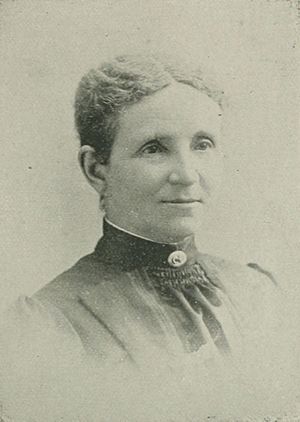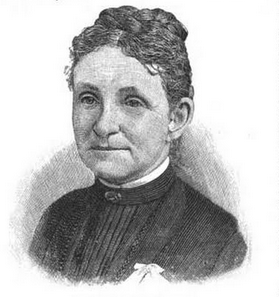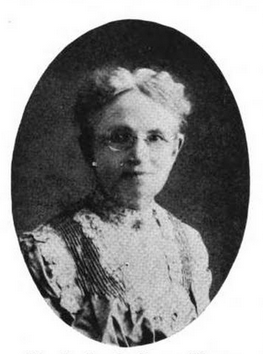Emeline S. Burlingame facts for kids
Quick facts for kids
Emeline S. Burlingame
|
|
|---|---|

"A Woman of the Century"
|
|
| Born | Emeline Stanley Aldrich September 22, 1836 Smithfield, Rhode Island, U.S. |
| Died | February 25, 1923 (aged 86) Providence, Rhode Island, U.S. |
| Resting place | Swan Point Cemetery, Providence, Rhode Island |
| Pen name | Aunt Stomly, Cousin Emeline |
| Occupation | editor, evangelist |
| Language | English |
| Nationality | American |
| Alma mater | Rhode Island Normal School |
| Subject | religion, temperance, suffrage |
| Spouse |
Luther Rawson Burlingame
(m. 1859; died 1890) |
Emeline S. Burlingame (born Aldrich, later Cheney; September 22, 1836 – February 25, 1923) was an important American editor, speaker, and activist. She used the pen names "Aunt Stomly" and "Cousin Emeline." She led the Rhode Island Woman's Christian Temperance Union (W.C.T.U.) for seven years. She was also the first president of the Free Baptist Woman‘s Missionary Society (W.M.S.).
Emeline was a licensed preacher and a delegate to the Free Baptist triennial conference three times. She worked for many religious newspapers, including being the editor of the Missionary Helper for eight years. She played a big part in getting a state law passed in Rhode Island to ban alcohol from 1884 to 1887. She also wrote a leaflet called “An Appeal to Women’s Missionary Societies.” This leaflet encouraged church women to support woman suffrage (the right to vote for women). The National American Woman Suffrage Association printed and shared this leaflet widely. Emeline Burlingame passed away in 1923.
Contents
Emeline's Early Life and Education
Emeline Stanley Aldrich was born on September 22, 1836. Her birthplace was Union Village, which is now called North Smithfield, Rhode Island. Her parents were Wellington Aldrich and Celeste Angell Aldrich.
She grew up in Providence, Rhode Island. At age 12, she started high school and finished when she was 15. After graduating, she began teaching to earn money. This allowed her to attend the Rhode Island Normal School (now Rhode Island College) for a year. Emeline was very good at remembering things, writing, and public speaking in school.
From a young age, her mother took her to church and Sunday school. When she was 15, she decided to become a Christian. She was baptized in April 1851. Her church, Roger Williams Church, supported important causes. These included anti-slavery, the temperance movement, and giving women more opportunities.
Her Career as a Leader and Speaker
After her schooling, Emeline taught for five years. In November 1859, she married Luther Rawson Burlingame. He was a graduate of Brown University. They lived in different places, including Wellsboro, Pennsylvania, and Whitesboro, New York. Her husband was a teacher and later a publishing agent.
In Dover, New Hampshire, Emeline started her public career. She began writing and speaking. She wrote articles for Morning Star, Little Star, and The Myrtle. She even became the editor of The Myrtle while living there.
Leading the Temperance Movement
In 1869, a speaker named Dr. Dio Lewis inspired women to fight against alcohol. Emeline joined a committee in Dover that visited saloons. She even led large public meetings.
In 1873, Emeline was chosen as the president of the Free Baptist Woman's Missionary Society (W.M.S.). This was a big step because women's societies usually asked a minister to lead their meetings. Emeline made sure women did their own work. She remembered feeling nervous but proud when she first led a meeting in 1873.
When she moved to Providence, she helped her husband edit Town and Country, a temperance newspaper. She was president of the Free Baptist W.M.S. from 1873 to 1886. Then, she became the editor of the Missionary Helper. This magazine was important for missionary workers.
In 1879, she became a secretary for the Rhode Island W.C.T.U. She started giving speeches and organizing groups across the state. In 1884, she became the president of the Union. For the next seven years, she worked hard for the cause. She spoke in churches, at conferences, and in schools. The W.C.T.U. was key in getting a law passed in Rhode Island to ban alcohol. Emeline worked tirelessly to keep this law in place.
Advocating for Women's Rights
In 1874, Emeline moved to Providence. She became very involved with the W.C.T.U. there. She was president of the state Union from 1884 to 1890. During her time, Rhode Island passed a state law banning alcohol for three years (1886-1889). She also worked hard in 1887 to get women the right to vote in the state. She lived to see both of these goals achieved across the entire country.
After leaving her state W.C.T.U. job, she became a National Evangelist. This allowed her to speak for the cause wherever she went. She often spoke every Sunday, attended many meetings, and managed the work at headquarters.
In 1886, Emeline left her role as W.M.S. President. In January 1887, she became the editor of the Missionary Helper. She worked in this role for eight years, adding new sections to the magazine.
In 1889, she became a delegate to the General Conference from Rhode Island. This was the first year women were allowed to be delegates. In 1890, she was licensed to preach. She traveled widely, encouraging missionary groups and preaching about "Applied Christianity."
In 1892, Emeline married Oren Burbank Cheney. He was the president of Bates College. They both had worked hard for Christian and reform causes. They supported each other in their efforts. In Lewiston, Maine, Emeline worked with young women at Bates College. She helped them create a set of principles for self-governance.
In 1894, she was elected recording secretary at the National Council of Women's meeting in Washington, D.C. Later that year, she resigned as editor of the Missionary Helper. After serving for ten years as President of the National Free Baptist W.M.S., Emeline believed that women needed the right to vote to do effective mission work. She wrote a leaflet called “An Appeal to Women’s Missionary Societies.” It urged church women to support woman suffrage for better missionary work. The National American Woman Suffrage Association printed and shared thousands of these leaflets.
Personal Life
Emeline married Luther Rawson Burlingame on November 24, 1859. They had five children, but only two lived to adulthood: Luther Day and Minnie Thomas. Her first husband, Luther, passed away in 1890.
On July 5, 1892, she married Rev. Oren Burbank Cheney. After Dr. Cheney died in 1903, Emeline lived with her daughter. On her 70th birthday, she wrote a poem called “I’m Seventy Years Old Today!” That same year, she wrote a book about her husband's life. In 1918, she moved back to Providence to live with her son. Even at age 85, she sometimes attended missionary or temperance events.
Emeline Burlingame died on February 25, 1923, in Providence. She was buried at Swan Point Cemetery in the city.
Selected Writings
- A birthday reverie. 1836-1906., 1906
- The story of the life and work of Oren B. Cheney, founder and first president of Bates college,, 1907
Images for kids
-
The Cheney house at Bates College
 | Precious Adams |
 | Lauren Anderson |
 | Janet Collins |




